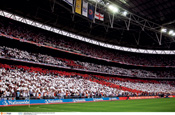The FA is now recruiting a high-calibre team to match that assembled for the London 2012 Olympic bid, which included Sir Keith Mills and Lord Sebastian Coe. The FA has already assigned headhunters to find a chief executive officer, chief operating officer, head of marketing and commercial and communications director, among other positions.
According to the FA, the lead marketer will oversee a host of marketing and sponsorship initiatives to raise funds from the private sector over the next two years. But if the FA needed any warning that fundraising may be a little harder in the immediate future, it needs look no further than London 2012.
The London Organising Committee of the Olympic Games (LOCOG) has enjoyed unprecedented success in attracting private-sector investment. However, after the credit crunch and falling house prices left a £250m hole in funding for the 2012 Olympics, London mayor Boris Johnson now plans to go cap-in-hand to the Chinese government for investment, offering it in return a share in a university that could be built on the site of London's Olympic Village.
By 2018 FIFA will have a new commercial structure, but it is unlikely to be a radical departure from its existing sponsorship set-up, which was implemented last year and runs until 2014. The programme comprises FIFA partners, such as Coca-Cola; World Cup sponsors, including McDonald's; and national sponsors.
English hopes for the 2018 event have been boosted by FIFA's commercially driven decision to award host status for two World Cups (2018 and 2022) at the same time. In addition, FIFA president Sepp Blatter said that prospective Southern hemisphere hosts would do better to wait until 2022.
The FA will know whether its bid is successful by 2011. It has several factors on its side. Hosting a football World Cup would be cheaper than the Olympic Games, as the infrastructure is already in place. Obvious match venues include Wembley Stadium, the City of Manchester Stadium, the Emirates Stadium and Old Trafford.
Moreover, some questioned the appetite of the British public for the Olympics before London won its bid to host the 2012 Games. The same cannot be said of the FIFA World Cup: vast numbers of viewers tuned in to watch this summer's European Champion-ships despite the home nations' failure to qualify, while England's domestic leagues are among the best-supported in Europe. All this bodes well for the FA when looking for private backers.
However, convincing those in FIFA's corridors of power, who ultimately decide which nation will host the tournament, is another matter. Influential characters, such as UEFA president Michel Platini and FIFA's Blatter, have often lambasted English football and will need persuading. Last year Blatter warned the FA that plans to play domestic fixtures overseas could have consequences for England's chances of hosting the tournament. He said: 'If you oppose the FIFA World Cup decision-makers - namely the FIFA executive committee - then you cannot expect the same board to make a decision in your favour.'
Winning the rights to host a World Cup takes as much planning, energy and enthusiasm as winning the event on the pitch itself. The FA is doing all it can, including sending an England XI to play in Trinidad & Tobago earlier this year in an effort to curry favour with Jack Warner, who heads the FIFA region representing North and Central America and the Caribbean. Let's hope the FA also gets its share of that other vital, but elusive, element - luck.
2006 FIFA World Cup, Germany
- Broadcast in 214 countries, reaching a cumulative TV audience of 26.3bn.
- World Cup final viewed by global audience of 715.1m viewers.
- All 64 matches sold out, with 99.5% capacity of each stadium filled on match days.
- FIFAworldcup.com received more than 4.2bn page views from 9 June to 9 July, more than double the traffic during the 2002 World Cup. An additional 73m page views were accrued by the mobile web portal.


